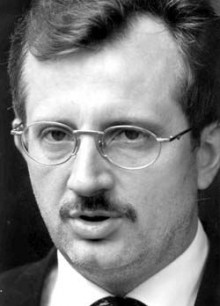The Ukrainian participants in the public hearings “Ukraine on the Eve of Parliamentary Elections” must have been affected by that summer evening in Brussels, or maybe they were in a good mood and did not want to spoil it by squabbles, which are traditional among Ukrainian politicians. After the hearings Marek Siwiec, Vice-President of the European Parliament, did not stint on compliments for the Ukrainian side, declaring that the political forces “are learning to listen.”
“If I compare this meeting with previous ones, I can see that the language of communication has become much better and more general for all political parties; there was less aggressiveness and less harsh confrontation. But what I think is even more important is that I can note distinctions, for example, between the Party of Regions and the Yulia Tymoshenko Bloc,” he told Ukrainian journalists.
Most interestingly, after paying all these compliments, the European dignitary admitted that he supports the idea of a broad coalition in Ukraine: “I believe that as a result of the elections it will be possible to form a coalition, and I am in favor of the broadest possible one.”
All the representatives of the political forces (Natalia Prokopovych, OU-NSD; Hryhorii Nemyria, BYuT; Volodymyr Vecherko, PR; Vitalii Shybko, SPU) were unanimous with regard to Ukraine’s European prospects. Vecherko noted that for his political force the priorities are rule of law, freedom of speech, and democratic progress: “Integration into the EU is a strategic objective for all of Ukraine. Ukraine is a large part of the economic and humanitarian European space. This is our party’s stand.” With his dignified pro-European stance Vecherko won Siwiec’s respect.
I asked political analyst Oleksandr DERHACHOV why the European official is so favorably disposed to the idea of a broad coalition and whether his message will be heeded in Ukraine.
Derhachov: Those in Europe who genuinely care about Ukraine must realize that the elections will solve a minor part of the problems that have cropped up, primarily in terms of political development. We’re gradually approaching a result that will give one of the sides an unconvincing advantage over the other.
As far as party programs are concerned, here one finds ample opportunities for reaching a broad agreement, yet the very logic of the election campaign makes this task difficult. On the one hand, Europe would like stability in Ukraine. Europe is interested in having legitimate elections here, and a broad coalition would be the most reliable way to recognize the elections’ outcome.
On the other hand, the Party of Regions is not mature enough to distinguish between its pragmatic managerial members and all those ideologues who are in fact acting like parasites on the half-awakened electorates in eastern and southern Ukraine. Because of this, it is more difficult to present this party as a participant in the project a “Ukrainian Ukraine.” There are no other grounds for a broad coalition. Ukraine will survive as a state if it forges ahead towards geopolitical freedom, self-sufficiency, and originality. The Party of Regions is a bad partner here.
A large coalition is practically impossible with Yanukovych, but if there are other options, then the option proposed by Europe will most likely be used. By other options I mean a situation in which the Party of Regions will nominate other leaders for governmental posts on its behalf; when there is an obvious shift of accents; when the kind of rhetoric being used by a number of leading PR figures is recognized as damaging to Ukraine’s national interests.
* * *
Raisa BOHATYRIOVA: There is no alternative to Ukrainian unity
A press release of the PR press service reads: “The Party of Regions hopes to build a coalition with the Socialist and Communist parties at the Verkhovna Rada after the elections.” Raisa Bohatyriova, coordinator of the fifth parliament’s majority, declared: “We are counting on the victory of our coalition allies (SPU and CPU), and on the formation of a political majority with them.”
She added that the Party of Regions will build this coalition with political forces that will share the PR’s priorities and support the party program. The possibility of the propresidential forces being among them is not ruled out: “Unlike the Orange people, we never say ‘never.’ In reality they’re all holding talks with us and will try to outdo each other to side with us after the elections.”
Bohatyriova believes that, even in the event of a landslide, none of the political forces will be able to form a stable parliamentary majority because one will be invariably confronted by an almost matching opposition. She says there is no alternative to Ukrainian unity, yet the Orange side persists in refusing to recognize that fact in its political practices. The propresidential forces, as demonstrated by the situation, do not wish and do not know how to unite — not only with the Party of Regions but even among themselves, says Bohatyriova.
The leader of the communists, Petro Symonenko, declared recently that only four political forces will make it to parliament: the Party of Regions, the Communist Party, BYuT, and the Our- Ukraine/People’s Self-Defense bloc.







